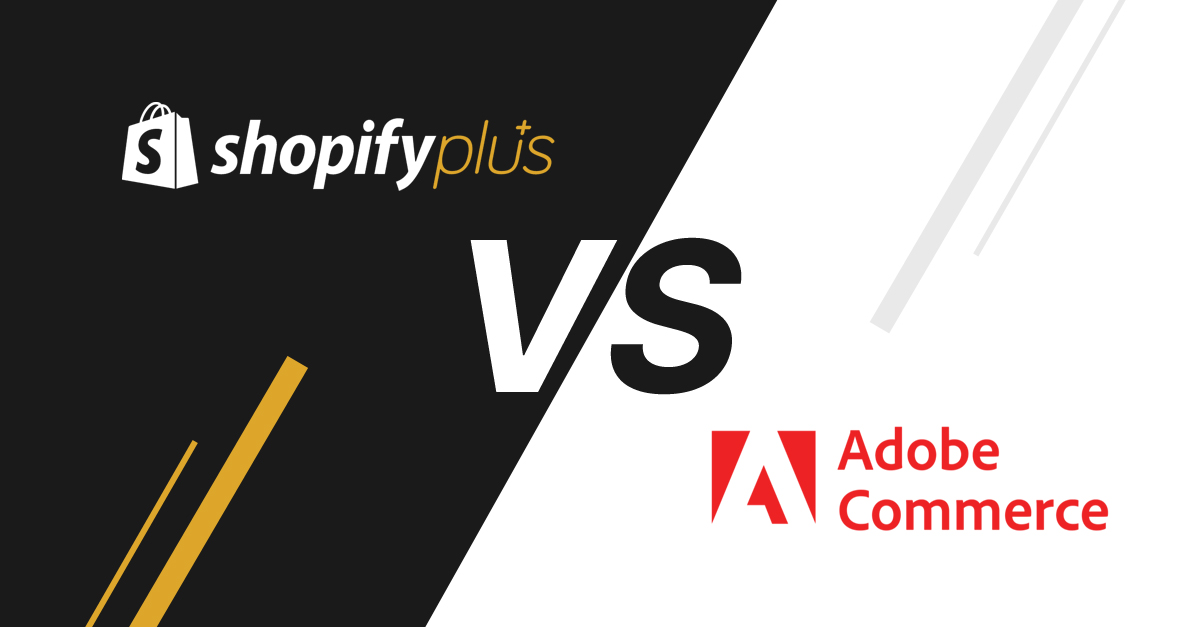Adobe Commerce(Magento) vs Shopify Plus: Which Is Better for Your Business?
-
 Kevin
Kevin
- 3 years

Adobe Commerce and Shopify Plus are amazing eCommerce development platforms suitable for managing large-scale B2C and B2B businesses. However, when it comes to choosing one, it is not an easy decision, and you need to consider many factors before investing.
The platform you choose must help you provide exceptional customer service, ensure website accessibility, boost sales, and seamlessly expand your operations. This article will look at different attributes to compare Adobe Commerce and Shopify to help you make the right business decisions and enjoy maximum profits. So, let’s get started.
What is Adobe Commerce?
Adobe Commerce is the premium version of Magento, a cutting-edge solution for businesses with aggressive growth targets. It is available on-premise as well as on the cloud. With more than $155 billion in GMV transacted on the platform per year, Adobe Commerce Cloud is the ideal choice for retailers all around the globe. It is also supported by a huge community of developers, solutions, and technology partners.
What is Shopify Plus?
Shopify Plus is the premium version of Shopify, which is the favorite platform of small retailers because of its ease of use. It is fully hosted and comes with many features suitable for small as well as large-scale organizations. Shopify Plus helps retailers set up a store and sell online quickly and effectively. It is a highly reliable, scalable, and SAAS-based eCommerce platform with fantastic functionality and a seamless user experience.
Adobe Commerce(Magento) vs Shopify Plus: Which is a Better eCommerce Development Platform?
Let’s compare both these platforms based on different attributes to find out which one is better for your business needs and in different scenarios.
| Attributes | Adobe Commerce | Shopify Plus |
| Technology | PHP (Zend framework) | Ruby on Rails |
| Customizability | ✔ | ╳ |
| Flexibility | ✔ | ╳ |
| Hosting | Self-Hosted or Cloud | Cloud |
| Support for Global Selling | Full | Partial |
| Multi-store Management | ✔ | ╳ |
| Artificial Intelligence | Adobe Sensei | ╳ |
B2B Functionality
|
✔ | ╳ |
| PWA | ✔ | ╳ |
| Ease of Use | ╳ | ✔ |
| Development Cost | High | Low |
| Pricing | Starts at $1,600 per month | Starts at $2000 per month |
| Scalability | High | Low |
1. The Total Cost of Ownership
The TCO of an Adobe Commerce solution is usually higher than that of a Shopify solution. And that’s because of the flexibility that Adobe Commerce provides.
First of all, you will pay a license fee to use these platforms as both of them are premium versions. For Adobe Commerce, the price starts at $1600 per month, and it is $2000 per month for Shopify Plus. Additionally, you will pay for hosting if you choose Adobe Commerce, but it is included in Shopify Plus.
While Shopify Plus is written on Ruby on Rails, Adobe Commerce is based on Zend Framework, which is PHP-based. Both of these technologies are amazing and robust.
Adobe Commerce is designed for endless customizations, and it does not impose any limits on merchants regarding features they want to implement to make their offerings better. On the other hand, many business owners find themselves outgrowing the functionalities of Shopify Plus, and they then start looking for alternatives for scaling up and down.
Thus, if you are looking for a powerful enterprise-level solution that gives you more control over your platform’s customer experience and you also have a budget for development work, Adobe Commerce is the ideal option. However, go with Shopify Plus if you want to launch a simple online store without much work at the backend and a normal CX.
2. Support for Global Selling
Using Adobe Commerce, retailers can deploy multiple multilingual/multi-currency websites and coordinate with worldwide shipping providers – all of this can be managed through a single Adobe Commerce instance and license.
While Shopify Plus also provides support for multiple currencies and languages, you will require different instances and costly licenses for managing different websites. Also, each instance will be isolated, and it must be managed separately with its own content and database.
In addition, Adobe Commerce provides advanced features like Magento business intelligence and seamless fulfillment options that introduce more agility to the operations of larger businesses. Unlike Adobe Commerce, Shopify also imposes limits on catalog size and product attributes, resulting in restricted merchant abilities.
3. Support for B2B
B2B eCommerce is continuously evolving and growing. As a result, a lot of businesses are now adopting hybrid business models to take advantage of different business models and to cater to a diverse range of target audiences. Thus, they are in need of a platform that supports B2C as well as B2B operations.
While Adobe Commerce provides full support for B2B, Shopify Plus lacks in many aspects. Adobe Commerce and Adobe Commerce Cloud are both built really well for B2B consumers, manufacturers, wholesalers, and distributors. For example, they allow you to set dynamic pricing. You can set different prices for different types of customers and provide discounts based on their relationship with your business. It is a crucial B2B feature that will help you take your B2B experience to the next level.
Also, you can use shared catalogs, quick orders, purchase order approvals, requisition lists, and many such features to increase conversions and grow sales. While Shopify also took a step towards B2B Commerce by acquiring Handshake, its reliability for B2B operations is yet to be proven.
Also Read: The Future of eCommerce & How Adobe Commerce Development Can Help Retailers Secure an Edge
4. Hosting
Hosting is a crucial part of every eCommerce website. And while hosting is included in Shopify Plus, Adobe Commerce provides you with two options – you can either host your online store on-premise or choose cloud hosting by Magento. You can either choose Adobe Commerce (which is a self-hosted platform) or go with Adobe Commerce Cloud (which is fully hosted and managed by Magento).
Thus, if you are looking for full control over hosting and other aspects of your online store, Adobe Commerce is an ideal option for you. On the other hand, it is best to go with Shopify Plus if you are looking for an economical alternative.
Wrapping Up
Now that you know the advantages and disadvantages of Adobe Commerce and Shopify, you are ready to make an informed business decision. What do we recommend? The answer is Adobe Commerce!
If you have a complex and large catalog, you want to grow your business globally fast and need extensive integrations to personalize your customer experience, there is no better option than Adobe Commerce. But, make sure you have the budget too to bear the costs associated with this dynamic platform.
On the other hand, if you have budget constraints and just want to test your eCommerce ideas, Shopify can suit your needs well. But, you will eventually need to migrate to Adobe Commerce for better growth. So, why not just start with it?
Having more than a decade of experience, we are Adobe Silver Solution partners and can help you navigate the complexity of the Adobe Commerce platform while keeping everything in your budget. Do contact us for more details.













